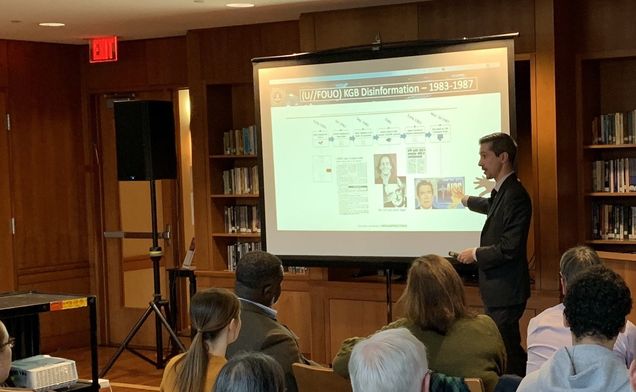Kristopher Grahame Gives Cyber Alliance Talk About Malign Foreign Influence Operations
Last week Kristopher Grahame, FBI agent and member of the U.S. Department of Justice in Boston, delivered a talk titled “Disinformation in the Age of Social Media: A Foreign Influence Briefing” to a full house at the Hillel River Room. This talk was put on by BU Information Security and co-sponsored by the Hariri Institute for Computing and the Cyber Alliance.

In his presentation, he explained how foreign influence is actively carried out on behalf of foreign governments and can take many forms, the most common being IT usage to target democracy, media, and social rifts. The effects of foreign influence on society can be quite severe as information is distorted or presented wrongly. Grahame gave an example of how the Internet Research Agency located in St. Petersburg, Russia is disguised as Pamela Moore’s Twitter account. The group is “a Russian company engaged in online influence operations on behalf of Russian business and political interests.” This company created tweets on fake accounts to attack US politics.

He explained that disinformation systems generally take on the following form: research, positioning, production, publication, amplification, calibration. They would research which area to target, position themselves in a way where they could influence many people, and publish false/distorted information that seemed appealing to the audience. The would amplify this information by spreading it around social media platforms to arouse reactions, hoping to draw responses.
As these malign disinformation systems usually have goals to wreak havoc on the US while benefitting their own country, Grahame beseeched the audience to take caution when reading the news or social media posts. He encouraged the audience to thoroughly research a person’s background and credibility before accepting their information and reposting it for other people to see. Kristopher Grahame desires to continually educate people on this topic by raising awareness and providing action steps to combat malign foreign influences in order to protect the nation, its citizens, and its democracy.
About the Cyber Alliance
The BU Cyber Security, Law, and Society Alliance (Cyber Alliance) is a collaboration between computer science researchers, law professors, and social scientists to position BU as a leader in the burgeoning global discussion on cybersecurity. The alliance aims to leverage BU’s disciplinary breadth to create opportunities for cross-disciplinary debate, research, and activities in pursuit of this goal. To find out about upcoming talks in the Cyber Alliance Series, click here.
